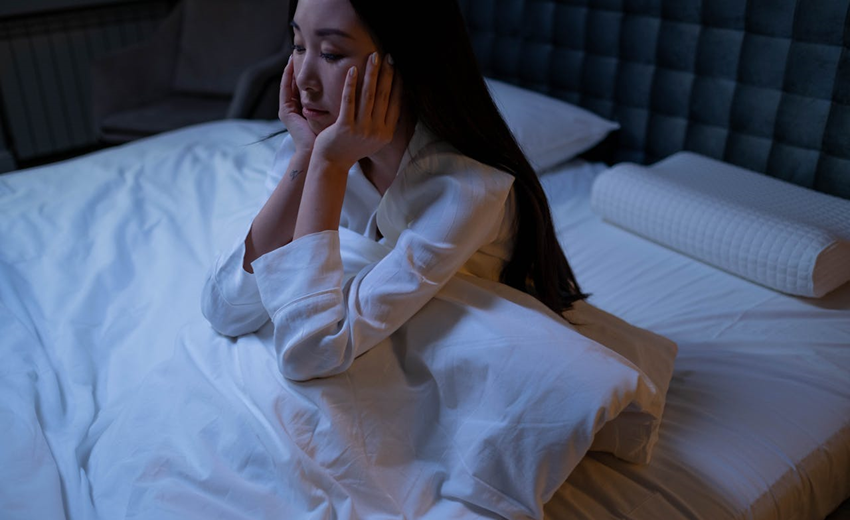
Adopting healthy, lifelong lifestyle changes is helpful in preventing insomnia from controlling your nights and leaving you sleepy all day. When you integrate these changes into your daily routine, they may help you fight insomnia without the use of drugs or more costly techniques.
Here are 10 effective lifestyle changes to make that help to combat insomnia:
1.Don’t use caffeine or alcohol, especially near bedtime
To keep insomnia at bay, eliminate caffeine close to bedtime, and more helpfully, during most of the day, as well.
Caffeine has been known to have effects lasting up to 24 hours, so its effects on sleep can be significant. It may cause you to wake up more frequently at night.
Alcohol is a sedative in the short term, but then its effects may lead to non-restful sleep and frequent bouts of awakening at night.
2.Include exercise in your daily routine
Exercise is beneficial to your overall health. In addition to combating insomnia, it can aid in losing weight, give you additional energy and enhance your mood.
Moderate exercise for 20-30 minutes each day helps you to receive the maximum benefits. You can add strength training or other types of workouts a few times a week, if you like.
Do not engage in rigorous exercise near bedtime, or it raises your blood pressure and body temperature. This affects the body’s natural release of melatonin, which helps you sleep.
Vigorous exercise should be done in the morning.
3.Set up a consistent sleep schedule
Setting up a consistent sleep schedule will help you to get more restful sleep and awaken less often during the night. It supports your body’s circadian rhythm, responsible for regulating your waking-sleeping cycle.
When you go to bed at the same time each night and awaken at the same time each morning, it helps your internal clock to improve your quality of sleep.
To set up a sleep schedule, set a fixed time for bedtime and wake-up.
Don’t nap during the day unless you really need to.
Create a relaxing routine for bedtime, allowing your body to wind down, so it can combat insomnia.
You can include pre-bedtime activities like warm baths, reading or relaxation methods, if you like.
4.List your worries before you go to bed
If you often go to bed with worries on your mind, take time before bedtime to write off those worries.
Make your list at least two hours before you go to bed. That offloads the worries and allows you to get quality sleep, since you will reduce your anxiety.
You can find worksheets online to guide you, or just make simple lists every evening.
5.Consider adding supplements that will help combat insomnia
Melatonin supplements can be helpful in cutting down the time it takes you to fall asleep.
There are other natural aids, too, like:
Glycine
Chamomile
Valerian
Be sure to purchase from reputable companies, since the Food and Drug Administration (FDA) does not regulate supplements.
6.Create a comfortable sleep experience
Falling asleep is easier if you have a feeling of comfort when you go to bed. Set up your bedroom environment to make it conducive to sleep.
You can use dimmer lighting, soothing music or nature sounds on CD, and a lower room temperature, which tells your body it’s time for sleep.
7.Reduce your exposure to blue light during the evening hours
Blue light is emitted by many electronic devices like tablets, laptops and cell phones. This is the worst type of light for your pre-bedtime routine.
Turn off those devices and your TV about two hours before bedtime.
8.Don’t worry excessively about poor sleep
If you worry excessively about not being able to sleep, you probably won’t be able to.
Don’t watch the clock and calculate how many hours you’ll have left. Unless you are charting in a sleep diary, try not to track the time you spend trying to get to sleep.
Rather, just relax and rest peacefully and quietly.
9.Incorporate relaxation practices into your daily routine
Techniques like deep breathing and muscle relaxation are helpful in relaxing. This eases your transition to deep sleep.
Mindfulness techniques and meditation help you to reduce anxiety from your day and promote relaxation.
10.Eat a balanced diet to combat insomnia
Balanced diets contain sufficient amounts of these macronutrients:
Protein
Fat
Carbohydrates
Whole grain carbs are preferred, since they can improve sleep. Try not to over or under-consume proteins, as this can impact sleep negatively.
Conclusion
Often, making positive lifestyle changes like the ones above can combat insomnia effectively.
This is especially true if you only have infrequent insomnia, but they can even help fight long-term insomnia.
If you have insomnia for several weeks or longer, consult a healthcare professional.
References:
https://my.clevelandclinic.org/health/diseases/12119-insomnia
https://www.webmd.com/sleep-disorders/chronic-insomnia-living-with
https://www.healthline.com/health/healthy-sleep/insomnia-home-remedies#exercise
https://www.webmd.com/women/insomnia-tips
https://www.sleepfoundation.org/sleep-hygiene/healthy-sleep-tips
https://www.healthline.com/nutrition/17-tips-to-sleep-better#blue-light
https://www.sleepfoundation.org/nutrition
https://www.calm.com/blog/insomnia-self-care








